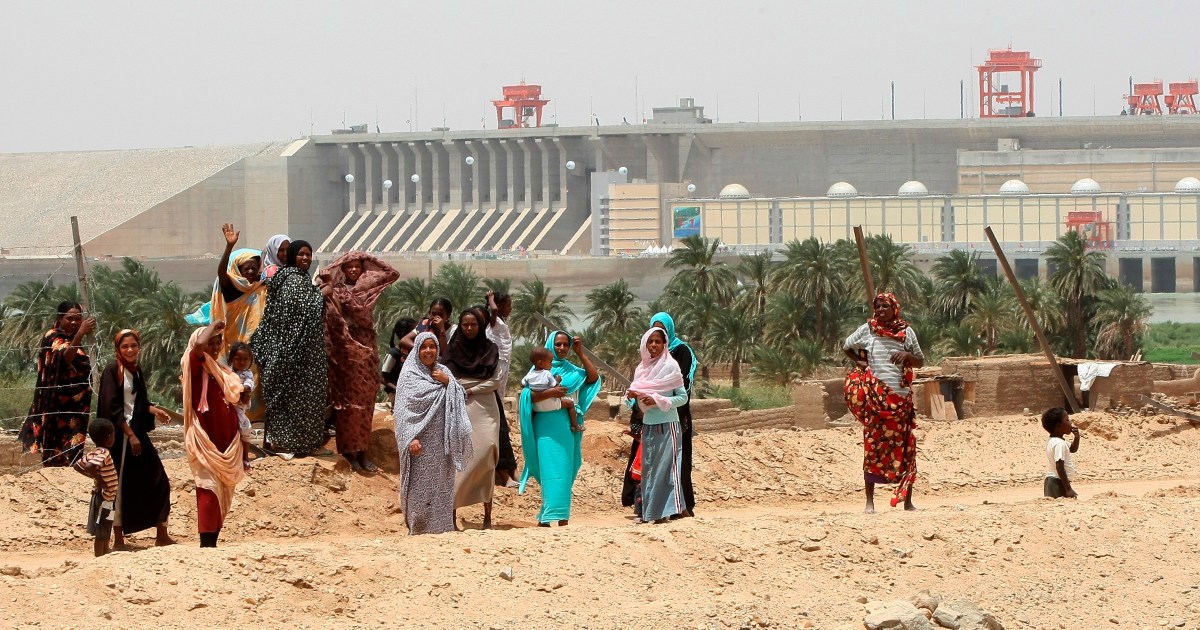The way was paved for China throughout the years of the ousted Sudanese President Omar Al-Bashir (1989-2019) to work with the Khartoum government as an ally.
At that time, Beijing benefited from the al-Bashir regime's estrangement from the United States and its European allies, since the US administration placed Sudan on the list of "states sponsoring terrorism" some 28 years ago, and the political and economic sanctions that followed imposed international isolation on Khartoum.
However, many waters took place after the ouster of al-Bashir in April 2019, and new variables emerged in Khartoum's international relations, foremost of which is rapprochement with Washington following the removal of Sudan's name from the list of states sponsoring terrorism in October 2020, and American and European support for the transitional government.
Observers believe that changing the equation does not necessarily mean igniting competition to the point of conflict between Washington and Beijing over this African country rich in natural resources that vary between oil, natural gas and minerals, especially gold, in addition to Sudan's possession of vast agricultural lands and huge animal wealth awaiting exploitation.
Since last October, the pace of Sudanese-American relations has started to improve significantly, according to the steps taken by both sides, perhaps the most prominent of which is the removal of Sudan's name from the list of terrorism, in addition to the mediation of (former President) Donald Trump's administration in an agreement to normalize relations between Tal Tel Aviv and Khartoum.
Contacts also continued between the US administration and the Sudanese (transitional) administration, and Andrew Young, Deputy Commander of the US Military Command in Africa, "AFRICOM" confirmed that his country wanted to strengthen its relationship with Khartoum and enhance military cooperation.
On the other hand, Khartoum has always been considered an important African station for China, which has implemented major economic projects in this country, especially the oil and construction sector.
Khartoum had previously turned to Beijing to extract oil after the blockade imposed by the United States since 1997, and China helped Sudan enter the list of oil countries in 1999.
On January 20, Minister in Charge of Finance Heba Muhammad Ali said, in press statements, that Sudan's debt to China amounted to $ 2.5 billion.
Beijing's investment in the country is estimated at $ 15 billion, according to the latest government statistics.
Political expert Haj Hamad Muhammad believes that "the American trend towards Africa in general, and Sudan in particular, has continued to take on a military character in a manner similar to the militarization of the market conflict, as weapons and training are the entrance of the United States to these countries, and Washington always aims to try to exploit Sudan for more dominance and dependence on global markets." .
He added, "But, as usual, America and European countries cannot continue to do so, since they do not have a long life in the development of a country like Sudan."
He also said, "Beijing has advantages that are difficult to remove from the scene in Africa and Sudan in particular, as it has a strong economy and does not interfere in the affairs of the countries that deal with it, and China has the ability to deal with Sudan because it provides conditions through a flexible system that allows for long-term payment of debts," It is not like America and the West that is draining resources at once. "
The limits of competition
and about the form of competition between Beijing and Washington over the Sudanese cake. The former ambassador and director of the Americas Department in the Foreign Ministry, Rashid Abu Shama, believes that the American rapprochement will not affect Sudan's relationship with China.
He explained that Sudan in the transitional period "is walking in balance in its foreign relations, and this applies to relations with China," adding that Joe Biden's assumption of the presidency of the United States "is sufficient to change the orientations of his predecessor Trump, the most hostile, and this change will give Sudan the opportunity to continue its good relationship with China as long as it proceeds with its investments." In the field of oil. "
China has traditionally provided aid to poor African countries, in the form of debt exemptions, in exchange for the acquisition of the establishment of development projects, and the provision of loans to establish public facilities.
Not far from this view, the director of the Khartoum Press and Publication Authority, Yusef Hamad Abdullah, excludes the possibility of an American-Chinese conflict over Sudan, and says, "These possibilities seem small, based on what happened from the Trump administration, which did not show any reaction to Beijing's role in presenting Support for Khartoum, even though his policy towards Africa focused on confronting the Russian Federation and China.
Abdullah indicated the need to wait for the clarity of President Biden's plan, at least in the first 200 days of his rule.
He listed the "advantages of the relationship" between Sudan and China, saying, "China is Sudan's largest trading partner, in addition to being the largest investor in oil through the government-owned China National Petroleum Corporation."
Abdullah also pointed to the decline in Sudan's oil production after the secession of South Sudan in 2011, from 450 thousand barrels per day to 70 thousand.
He continued, "The oil industry is very frustrated in recent years due to government policies and future oil prospects that have accumulated outstanding debts. Consequently, Chinese companies and other Malaysian and Indian companies have become more reluctant to expand oil investments, which means that there is nothing of current importance that can be contested, either." Overt or covert. "
He also warned that "China is more concerned with strengthening the Road and Belt Initiative that it has adopted as part of a broader plan for trade expansion in Africa. However, Sudan is not likely to be the bone of the conflict with the United States, which is more interested in Khartoum and supporting the ongoing transition."

